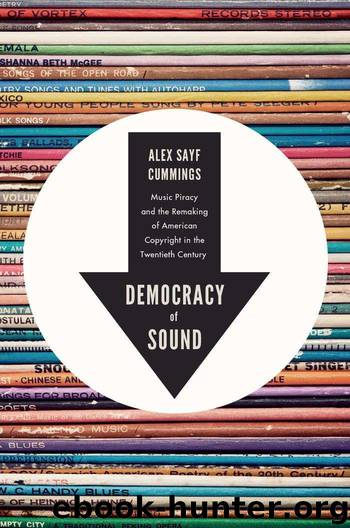Democracy of Sound: Music Piracy and the Remaking of American Copyright in the Twentieth Century by Cummings Alex Sayf

Author:Cummings, Alex Sayf [Cummings, Alex Sayf]
Language: eng
Format: mobi
Publisher: Oxford University Press, USA
Published: 2013-02-14T07:00:00+00:00
The Politics of Enforcement
The Sound Recording Act took effect on February 15, 1972, but tangible results did not materialize right away. Offenders had to have the opportunity to break the new law, and it took time for federal law enforcement to track the offenders and build cases against them. In the meantime, the RIAA took advantage of the Supreme Court’s mandate in Goldstein to press state and local authorities to enforce existing antipiracy laws and to pass them where they did not exist. Twenty-seven states had passed such statutes by 1975, but the coverage was patchy. In the Midwest, for instance, Indiana and Nebraska had barred unauthorized copying of sound recordings, but Illinois, Iowa, Michigan, and Wisconsin had not, making it easy for pirates to evade criminal prosecution or civil suits.94
Pirates of pop hits carried on much as before, retailing their tapes in outlets where music was not conventionally sold. As Max Arons of the American Federation of Musicians observed, “In New York State every garage and everywhere else, every drug store they can get it.”95 The Chicago Tribune found them in “gas stations, laundromats, convenience food stores, and the like.”96 Mom-and-pop pirates relied on mom-and-pop outfits such as the local drug store to sell their products without anyone important noticing; the small business also represented a poor target for an industry lawsuit, unlike a record store chain like Sam Goody.97
RIAA agents had to explain to many policemen that pirates were actually violating the law. Francis once spent several hours at a precinct in downtown Manhattan, explaining to the secretary that he had found several stores around town selling pirate tapes. She eventually decided to transfer him upstairs, where he explained to two detectives that New York had a state law against piracy. “One of the detectives was willing to listen and the other fellow felt it was too much trouble to pursue an obscure misdemeanor and suggested some other bureau handle it,” Francis said. Following a call to the assistant district attorney’s office, he ended up recounting the story twice more to several other detectives that afternoon.98
If police in downtown Manhattan had not been informed of the antipiracy law, how much easier would it be to violate the statute in some remote hamlet upstate? Unless the FBI stepped in to enforce federal copyright, record companies had to rely on state laws that were carried out by city, county, and state police. Where states had only made record copying a misdemeanor, police departments seldom placed a high priority on seeking out pirates or following up on complaints.
The case of Jack and Julius Kessler suggests that pirates had begun to coordinate such operations nationwide, consciously choosing production sites they believed were beyond the reach and attention of law enforcement.99 From 1971 to 1972, the Kesslers worked with Leonard Lockhart, owner of a dress manufacturing company called Playgirl Industries, to produce tape anthologies of pop music such as Janis Joplin’s Greatest Hits and The Best of Rock, 1970. They did attempt to meet their obligations under the compulsory license system, sending out $95,578.
Download
This site does not store any files on its server. We only index and link to content provided by other sites. Please contact the content providers to delete copyright contents if any and email us, we'll remove relevant links or contents immediately.
| Africa | Americas |
| Arctic & Antarctica | Asia |
| Australia & Oceania | Europe |
| Middle East | Russia |
| United States | World |
| Ancient Civilizations | Military |
| Historical Study & Educational Resources |
Cecilia; Or, Memoirs of an Heiress — Volume 1 by Fanny Burney(31332)
Cecilia; Or, Memoirs of an Heiress — Volume 3 by Fanny Burney(30934)
Cecilia; Or, Memoirs of an Heiress — Volume 2 by Fanny Burney(30889)
The Secret History by Donna Tartt(16623)
Sapiens: A Brief History of Humankind by Yuval Noah Harari(13052)
Leonardo da Vinci by Walter Isaacson(11902)
The Radium Girls by Kate Moore(10907)
Sapiens by Yuval Noah Harari(4537)
The Wind in My Hair by Masih Alinejad(4424)
How Democracies Die by Steven Levitsky & Daniel Ziblatt(4398)
Homo Deus: A Brief History of Tomorrow by Yuval Noah Harari(4279)
Endurance: Shackleton's Incredible Voyage by Alfred Lansing(3843)
The Silk Roads by Peter Frankopan(3759)
Man's Search for Meaning by Viktor Frankl(3631)
Millionaire: The Philanderer, Gambler, and Duelist Who Invented Modern Finance by Janet Gleeson(3569)
The Rape of Nanking by Iris Chang(3516)
Hitler in Los Angeles by Steven J. Ross(3437)
The Motorcycle Diaries by Ernesto Che Guevara(3332)
Joan of Arc by Mary Gordon(3258)
